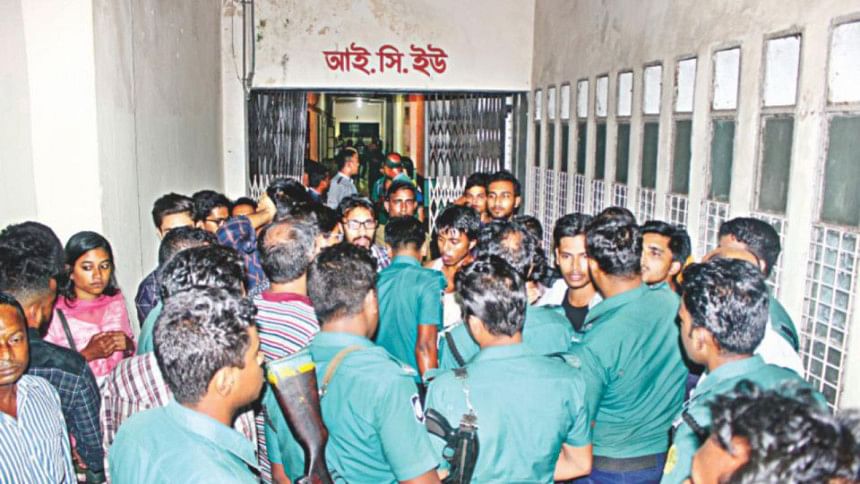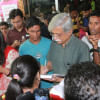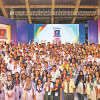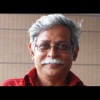Aftermath of a ghastly attack

The attack on Zafar Iqbal has been profoundly appalling but not surprising. He has been stalked for a few years since being put on the hit list by elements fed on a dogmatic diet to finish those off who didn't fit into their narrow view of life.
Death threats were issued to the popular teacher and writer on the phone or by mail. Security alerts would be raised accordingly with close police surveillance literally surrounding him 24/7. But his detractor kept track of the professor's movements and prepared to throw away his life on a suicide mission and given half a chance, would use it with lethal effect.
And, that is exactly what he attempted to do. But thankfully through police and student intervention and prompt medical treatment, the professor's life was saved although he suffered severe injuries. The attacker is in police custody, alive and in a position to be interrogated to dig information from and provide leads on certain popping questions: Whether he was a lone wolf acting under orders from a sleeping cell or a homegrown mentoring group.
The cornering of international terrorism nucleus from Syria and their beleaguered dispersal all over the region have given rise to so-called sleeper cells or barely regrouped entities on the side-line. This is referred to by way of suggesting the sense of desperation that pervades the minds of religious extremists worldwide.
Still, it is relevant to note that in the UK, France and perhaps Germany, de-radicalisation cells or even homes have been set up to debrief and rehabilitate returnees from the terrorist clutches or those on the verge of being converted on the listless journeys they undertook.
In the case of Faizul Hasan, the attacker of Dr Zafar Iqbal though, the police preliminarily suspect that he may be linked to Ansarullah Bangla team. Also known as, as The Hindustan Times reported, "Ansar al Islam, which is linked with al Qaeda in the Indian subcontinent."
The report of March 4 added, "Suspected Islamist extremists have carried out a series of attacks on secular and atheist writers and bloggers in the last four years, killing around a dozen of them including a top Bangladesh origin American atheist blogger."
With this in the backdrop, and the latest daylight knife attack on Zafar Iqbal to add, concerns have been expressed by some 16 prominent persons who were put on the hit list of extremists of the religious stripe. Of course understandably, police surveillance and protective posses have been deployed around them.
If I recall correctly, a high police official admitted that insofar as intelligence cover is concerned, it is easier to provide this but when it comes to bodily protection it may be difficult if the exposure is multi-directional. This insight may be kept in mind while detailing personnel for people having received death threats.
Some important gleanings from the media coverage, particularly of The Daily Star on the Zafar Iqbal episode deserve recitals, going forward. The prime minister's prompt instructions for medical treatment of Dr Zafar Iqbal are facilitating his speedy recovery. This has highlighted her government's concern for the safety of persons vulnerable to fanaticism-induced attacks.
Having said that, we attach a high degree of importance to investigating the attack on Zafar Iqbal, its background, the manner of its happening and the revealing of full facts about the event. On the face of it, the fanatic looked like being a loner but in truth the assault must have been an outcome of group planning and support. As the investigation goes on, should there be even an attempted politicisation of the incident, it could cast a shadow on the results of the investigation. A blame game would be as unfortunate as it is superfluous, especially when the perpetrator is in police hands.
Another point to flag off relates to selective use of the law against insinuating and hate-induced remarks in the social media.
Let me tick off some insightful observations from the opinion-piece headlined, "Tackling Radicalisation—Looking for answers," published in The Daily Star last Wednesday:
Monirul Islam, the Chief of Counter-Terrorism and Transnational Crime unit, DMP, among other things, said, "The responsibility of the correct interpretation (of certain Ayaats and the Hadith) lies with Islamic clerics and scholars."
Mohammad Monzur E Elahi, Assistant Professor of Islamic Studies at National University, made points of practical relevance: "if someone is found to be demeaning to Islam or blasphemous, all you can do is counter them intellectually, by engaging them in debate or producing your own arguments, trying to make them see your point, but under no circumstances can you use violence…existing religion-based institutions should be strengthened and, where necessary, reformed to further spread the message of tolerance. And, "religious gatherings and seminars can play an important role in highlighting the proper values and teachings of Islam."
More focus is needed on "de-radicalisation and counter-radicalisation programmes," said the professor, adding that we "need a strong" counter-radicalisation strategy for the cyberspace.
Shafqat Munir, a research fellow with the Bangladesh Institute of Peace and Security(BIPSS), added the closing words, "This is not just a security problem—it is a national problem, a societal problem" and we must harness the ability of the society to fight the menace.
Shah Husain Imam is adjunct faculty at East West University, a commentator on current affairs and former Associate Editor, The Daily Star.
Email: [email protected]










Comments